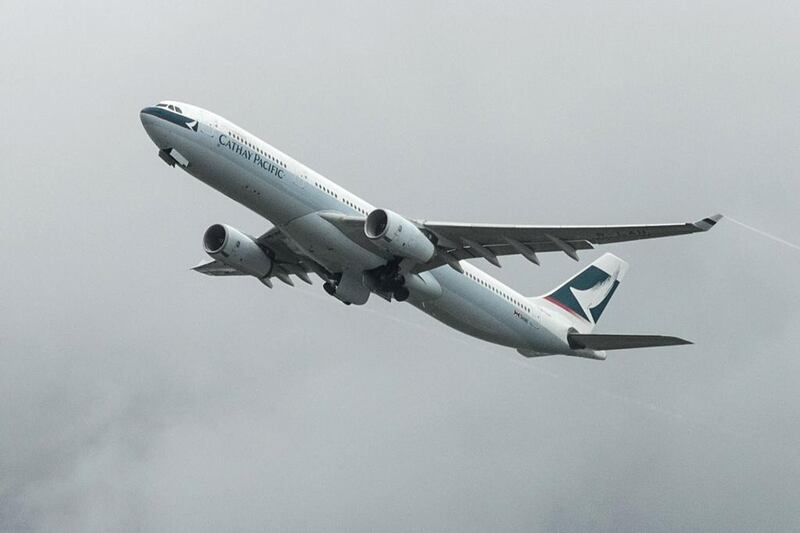Cathay Pacific, Asia’s biggest international carrier, says it’s getting tougher to find premium fliers from Hong Kong.
The lack of first and business-class travellers from the Asian financial centre - the worst since the global financial crisis days of 2009 - is such a dent on Cathay’s financials that analysts are asking whether chief executive Ivan Chu needs to find a Plan B. After more than two years at the helm of the marquee Hong Kong airline - his two predecessors stayed for about three years at the top - Chu is under pressure to revive earnings that have slumped amid an expansion by his Chinese and Middle Eastern rivals.
Cathay shares have lost about 25 per cent of their value since Chu took over while passenger yields - the amount earned by carrying a person per one kilometre, and a key metric of profitability - slumped to their worst in seven years. With Chinese airlines offering more direct services to the US and Europe from the mainland, Cathay’s Hong Kong hub is no longer critical. The carrier also reported on Wednesday that it lost HK$4.49 billion ($579 million) from fuel hedges in the first half of the year.
“Everything is quite negative for them and their business model is ripe for change,” said Shukor Yusof, founder of aviation consulting firm Endau Analytics in Malaysia. “They need to review their hedging and focus on things that have contributed to growth. They should focus more on regional services.”
The carrier reported on Wednesday an 82 per cent drop in first-half net income. Passenger yields fell 10 per cent to 54.3 Hong Kong cents as an economic slowdown in China hurt premium class demand and depressed corporate travel from Hong Kong to London and New York, Cathay said. Security concerns related to terrorism has also dented travel demand, Chu said in an interview with Bloomberg Television.
Hong Kong-based conglomerate Swire Pacific is the largest shareholder of Cathay, owning 45 per cent of the Hong Kong-traded airline. Aviation brought in 20 per cent of revenue last year for Swire, which will report first-half earnings Thursday. Swire is expected to post a 26 per cent drop in core profit to HK$3.75bn, primarily on lower property trading, according to a report of Bank of America Merrill Lynch on August 17. The bank also trimmed full-year earnings per share by 3 per cent to reflect Cathay’s lower profit.
Cathay launched summer sales for premium class in May, offering as much as 30 per cent discounts, in a bid to boost passenger load in low season of business travelers, Chu said.
Adverse factors
There’s more pain to come. Chairman John Slosar said in a statement on Wednesday that the business outlook “remains challenging” as the operating environment in the second half continues to face the same adverse factors.
“There’s not much we can do about the economic environment,” Chu said in the interview. “We hope it is a short-term issue rather than a long-term one. We are going to have very competitive fares.”
Chu was elevated to the top job in March 2014 after his predecessor was named chairman of the group in a reshuffle of top management. Chu, Slosar and Tony Tyler, the three most recent CEOs, all served as chief operating officers.
Shares of the carrier fell 3.5 per cent to HK$11.50 as of 11.47am in Hong Kong, extending yesterday’s 7.3 per cent decline, which was the most in a year. “We do not expect a recovery in profitability for the second half of 2016 and flag a likely lack of share-price catalysts in the near term,” Kelvin Lau, an analyst at Daiwa Capital Markets Hong Kong Ltd. said in an Aug. 17 note, maintaining a hold recommendation.
Cathay’s yields have been under pressure as Air China, China Eastern Airlines and others offer more direct services from the mainland. That’s coming at a time when the Middle East’s Big Three - Emirates, Etihad Airways and Qatar Airways - expand more into Asia and offer luxuries such as butlers and shower rooms.
“Cathay needs to change their business model from being a hub airline to a more point-to-point airline,” said Mohshin Aziz, an analyst at Malayan Banking. “But I don’t think that will happen in my lifetime.”
business@thenational.ae
Follow The National's Business section on Twitter





